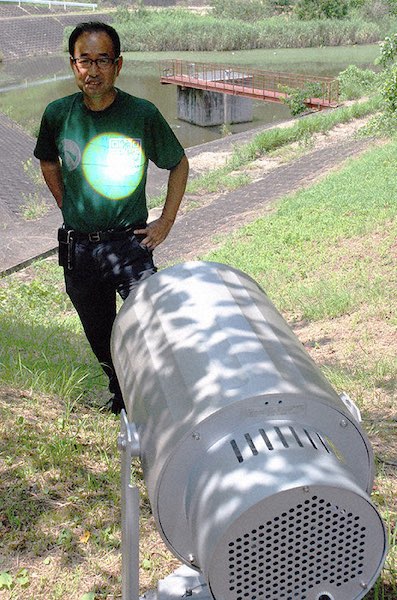Home
A comprehensive resource for safe and responsible laser use
Japan: Laser searchlight proposed to use QR codes to rescue hikers and climbers
The team, which is conducting the experiment at a campus in the western Japan city of Nara, has successfully scanned the two-dimensional code from a distance of about 300 meters and aims to put the system into practical use in the near future.
The code for the system measures about 11 centimeters (4.3 inches) on each side and is made from a retroreflective material. The print employs the same principle as that for reflecting road signs and can be scanned by a powerful laser searchlight.

A laser searchlight lights up a QR code on professor Yoshinobu Maeda's shirt at a Kindai University campus in the city of Nara. (Mainichi/Yasuhiro Okawa)
In responding to an actual situation, the team works on the assumption that a large laser emitter will be loaded on a helicopter to scan the mountain surface. The machine can spot a QR code from the light reflected from the ground. It's possible to identify a disaster or accident victim if their personal information, such as name and sex, has been registered with the code.
The system is being developed by a team consisting of scientists at the Faculty of Science and Engineering, and the Faculty of Architecture at the university.
Team leader Yoshinobu Maeda, a professor with the Faculty of Science and Engineering, said, "The system is technically advanced to a level where it can be introduced. The problem is how we spread its use. It's necessary for many people who enter mountain areas to wear clothes with QR codes and for helicopters to be equipped with laser searchlights."
From The Mainichi
UK: 1300+ laser incidents in 2013
The newspaper also reported that in the 12 months between October 2012 and September 2013, there were 31 reports of aircraft being illuminated as they approached Gatwick Airport, 30 miles south of London.
Laser strikes have also increased on rescue helicopters flying out of Redhill Aerodrome, Surrey, a few miles north of Gatwick. A tactical flight officer was quoted as saying “I've had to break away from a task because of being lasered and it's not because we're trying to catch a bad guy, it's because we're trying to find people potentially in danger.... There are certain elements of society that might be trying to harm us or put us off being in a certain location.”
Police inspector Mark Callaghan told the Mirror that there have been a number of jail terms for perpetrators, but that "Hand-held lasers are easily obtained over the internet or from market stalls and street vendors abroad. The warning labels on these are misleading and they are more powerful than advertised."
From the Surrey Mirror
Switzerland: Air rescue pilots to use laser protective eyewear
The action was taken because laser attacks are on the rise: six in 2009, 11 in 2010 and 16 to mid-October in 2011.
The sale of strong laser pointers was banned in Switzerland in May. The Federal Health Office is currently reviewing the possibility of banning their possession and use. Checks carried out by the Federal Office of Metrology this year showed that more than 95 per cent of the pointers tested were stronger than the permitted limit.
From SwissInfo.ch